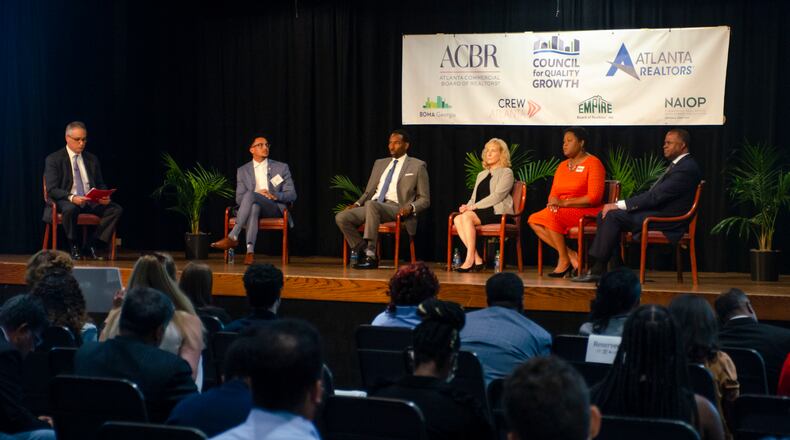Realtors and developers convened at Clark Atlanta University Tuesday night to question several candidates running to become Atlanta’s next mayor.
City councilmembers Antonio Brown and Andre Dickens, along with attorney Sharon Gay, Council President Felicia Moore, and former mayor Kasim Reed, participated in a forum hosted by Council for Quality Growth, the Atlanta Commercial Board of REALTORS®, and the Atlanta REALTORS® Association.
Fourteen people qualified in the race to replace Mayor Keisha Lance Bottoms, but the five aforementioned candidates are the only ones who cracked 3% in a poll commissioned by The Atlanta Journal-Constitution.
Atlanta Business Chronicle publisher David Rubinger asked the candidates about public safety, Buckhead’s cityhood movement, and diversity in housing options.
Brown said putting more police officers on the streets won’t solve crime and that leaders need to “create a socioeconomic shift” in the “class system of Atlanta.” He was one of the four council members to vote against construction of a new public safety training center on forested land for “a number of reasons,” he said.
“We have to focus on community policing,” Brown said.
Dickens said he voted for the center to give officers a place to learn “racial sensitivity” and de-escalation tactics. He wants to hire 250 more officers and specialists to handle people in mental health crises and homelessness.
Gay said the training center will cultivate smart community policing. She also said Atlanta needs leaders who can convene with regional partners to reduce “brazen violent crime and murders.”
Moore promised to focus on youth engagement, stronger code enforcement, and collaboration with the courts and police to hire more officers. As council president, Moore didn’t vote for the center but voiced support for it. The proposal passed with a 10-4 majority.
Reed said he’d hire 750 officers, reopen 33 community centers, and keep the city jail open to focus on up to 600 repeat offenders. He supports creating a new police center, but he’s “not yet persuaded that the location is the best location.”
The candidates all agreed that Buckhead shouldn’t secede from Atlanta as they expressed sympathy with that community’s concerns about violent crime.
“People who live in Buckhead are fed up,” Gay said.
Gay said her mother grew up in Buckhead, and Dickens reflected on his time living in that area. Moore said she previously represented Buckhead as a councilwoman, and Brown said “political interest groups” are fueling the city’s divide.
Reed said he can prevent Buckhead cityhood given how the East Lake Country Club, Emory University, and the Centers for Disease Control and Prevention “decided to annex into Atlanta” during his eight years as mayor.
Rubinger also asked the candidates if the city should build more housing in historic neighborhoods. They all agreed affordable housing is necessary, but only Gay and Moore explicitly opposed major disruptions to historic neighborhoods.
Gay said she would use the “400 acres of city owned Atlanta Housing Authority property” to create more housing, but also said she wants to create housing “at all different price points.” Moore said the city needs to improve its services and infrastructure while expanding housing in partnership with the private sector.
Reed said Atlanta needs to improve every MARTA stop before they can improve housing options, which he said would involve 877 acres of city-owned land. Brown said he would prioritize community input in development within neighborhoods.
Dickens promised to build or preserve 20,000 affordable housing units in eight years. Bottoms made a similar pledge to do so by 2026. But Dickens said he would start with the Atlanta Housing Authority properties.
“We haven’t built a single family-oriented residence on AHA properties in 12 years,” Dickens said.
The candidates also discussed city services, campaign finance reform, Beltline accessibility, job growth, and regional governance. The event attracted more than 600 attendees in person and virtually for nearly two hours.
About the Author
Keep Reading
The Latest
Featured



